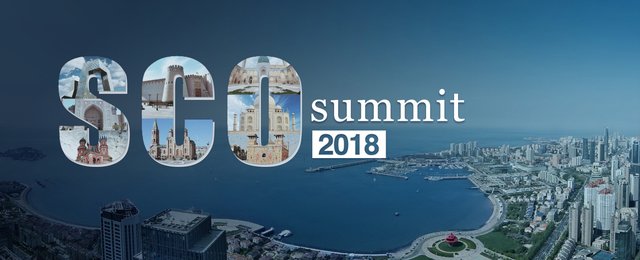
The G7 Summit of Western Nations and Japan in Quebec was not the only transnational summit that took place over the weekend. In one of China's busy east coast cities, a parallel summit took place between the Eastern Nations, notably China, Russia, Kazakhstan, Kyrgyzstan, India, Pakistan, Tajikistan, Uzbekistan, and its two most recent additions, India and Pakistan. Four nations, Iran, Afghanistan, Mongolia, and Belarus enjoy observer status. Turkey, Armenia, Azerbaijan, Nepal, Cambodia, Sri Lanka, Egypt, Syria, Bangladesh are either dialogue partners, or they are observer applicants. The summit that took place in Qingdao is the 2018 Shanghai Cooperation Organization Summit. At Qingdao, important topics were discussed.
Iran

(Image courtesty of Straight Times, June 9, 2018)
One of the topics discussed at the SCO summit is Iran, trade with Iran, and even full Iranian membership into the inter-governmental bloc, and member states' relations with Iran after U.S. pullout from the 2015 JCPOA Nuclear Agreement. Iran previously applied for SCO membership since 2008, but was denied full membership due to pre-JCPOA U.N. sanctions. In the wake of U.S. withdrawal from the JCPOA, there is strong consideration by the SCO, as by president Vladimir Putin of Russia, to admit Iran as a full member into the organization. Without U.N. sanctions, the SCO member do not feel obliged to follow additional U.S. sanctions.
With increased hostilities by the U.S. and uncertainty from the Europeans in honoring the JCPOA post-U.S. pullout, due to Europe's heavy reliance on the U.S., and not wanting to go back to economic isolation, there are heavy incentives for the Islamic Republic to join the SCO and improve its relations with the East. Distrust towards the west, especially from the Iranian conservatives and Khomeinist doctrinaires, including supreme leader Ayatollah Khamanei still lingered even during America's membership in the JCPOA. The U.S. withdrawal came to no surprise to Ayatollah Khamanei, who holds long-standing antagonistic views towards the U.S. This distrust is also evident from the moderates and reformers who view the US pullout with great disappointment. China, Russia, and India are viewed as more reliable partners to the Islamic Republic.
Trade
The SCO summit comes at a time of heavy populist backlash against globalization. Many people feel left-behind by the prevailing consensus of globalization. Each SCO nation has promised to follow WTO rules on trade and encourage and strengthen free, fair and transparent trade. There are also calls to promote a more equitable global system in response to anxieties and distrust towards the promotion of free market...many of which have went unanswered during the prominence of the Washington-based Neoliberal doctrines.
The Chinese president has also fired at the Trump Administration's trade policies, calling them "selfish" and "short-sighted" and called for more opening in the global economy, going against the grain of the populist tide that has become prominent in the past few years. He has also called for the world to "move beyond Cold War thinking." This pronouncement comes after U.S.-imposed tariffs on various nations over steel, aluminum, agricultural products.
Security

(Imagine courtesy of Sputnik International, May 1, 2018)
Security problems around the world, especially at it relates to terrorism, increased tensions between countries, and separatism, and cybersecurity issues. Many SCO member states, especially the Big-4 of China, Russia, India, and Pakistan. Afghanistan and the ongoing conflict between the Kabul-based government and the Taliban were points of discussion, with the Americans locked in a quagmire that has long surpassed the Vietnam War in length, with no end or peaceful solution in sight. To make matters worse, The Islamic State (IS) has recent inroads into Afghanistan, and unlike the fundamentalist, but more rational Taliban, who show a capacity in engaging in diplomacy and agreements. The IS on the other hand is notorious for its mission of violent confrontation against all including the majority of the world's Muslims, they deem to be "kuffar" or disbelievers, as witnessed in their failed campaigns in Iraq and Syria. The IS presence in Afghanistan poses a challenge for the SCO.
India, Pakistan, The Kashmir Issue
Two of the most important countries in the organization, India, which is the second most populous country in the world and a rapidly developing economy, and Pakistan, which is an important Muslim country and entry point into the Indian Ocean and a likely key to any Afghanistan solution in the organization are also two countries with very contentious relations towards each other, with ongoing tensions dating back the post-WWII partition of the Asian Subcontinent. Indo-Chinese relations are also fraught with long-standing tensions. Points of disagreement between China and India have occurred over China's Belt and Road Iniative, with Indian President, Nerendra Modi in opposition to the Chinese plans to facilitate trans-national development. The Kashmir issue between India and Pakistan also proves to be a tough issue.
References: